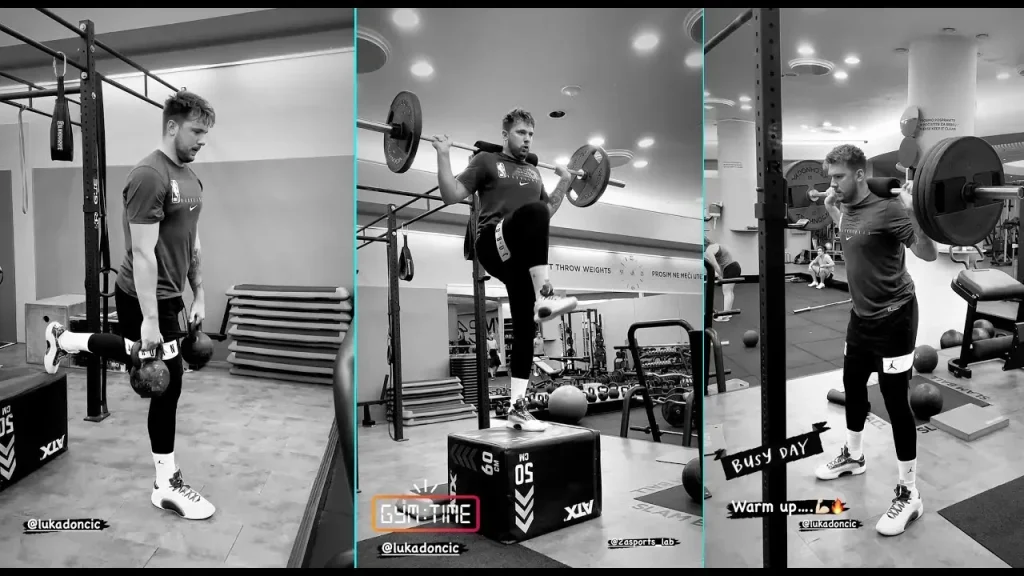Luka Dončić’s offseason training has taken a transformative turn this year, showcasing his dedication to becoming a better player. After an intense season with the Dallas Mavericks, punctuated by a calf injury and a surprising trade to the Los Angeles Lakers, Dončić recognized the need for a fresh approach to his training regimen. This offseason, he not only prioritized basketball recovery but also embraced innovative athlete training methods to enhance his performance. Implementing a combination of intermittent fasting and reduced court time, Dončić focused on sports conditioning that allowed his body to heal and regenerate adequately. As he steps into the upcoming NBA season, fans are eager to see how this unique offseason strategy impacts his game and overall physical readiness.
In the realm of basketball, offseason preparation is critical for athletes like Luka Dončić, who are constantly seeking improvements and recovery strategies. The summer months present a unique opportunity for players to recalibrate their physical and mental stamina, especially after taxing competitive seasons. By emphasizing a multifaceted approach to athlete training, including various fitness techniques and sports activities, players can achieve greater strength and conditioning. Such strategies not only minimize the risk of injury but also optimize performance, allowing athletes to return to the court rejuvenated and ready for the challenges of a new season. As we explore the techniques employed during Luka’s break from the game, the importance of holistic training becomes clear.
Revolutionizing Offseason Training: Luka Dončić’s Unique Approach
This past offseason, Luka Dončić took an unconventional route in his training regimen that received both criticism and praise. After suffering a calf injury and being traded to the Los Angeles Lakers, it became imperative for him to rethink his training strategies to enhance his performance. His physiotherapist, Javier Barrio, proposed a radical idea: a month-long break from basketball. This decision was pivotal in allowing him to focus on recovery while experimenting with alternative forms of training such as pickleball and padel. Not only did this diversify his workout, but it also provided vital rest to specific muscle groups that endure strenuous basketball activity.
Dončić’s training extended beyond simple physical recovery. The mental aspect of stepping away from basketball played a key role. Constant action in the NBA can carry a significant psychological toll, often leading to burnout among young players. By allowing himself time away from the court, he rejuvenated his passion for basketball while alleviating pressure and stress. This innovative melding of recovery with sports conditioning demonstrates that athletes should not only focus on traditional methods but also embrace diverse training techniques to enhance performance and well-being.
The Importance of Recovery in Athletes’ Training Regimens
For many athletes, recovery is just as crucial as the training they undergo. Luka’s decision to step away from basketball for an entire month underscores how this time off wasn’t a setback, but rather a strategic move towards long-term success. Research in sports conditioning highlights that effective recovery strategies can prevent injuries, improve muscle function, and enhance overall athletic performance. By prioritizing recovery, athletes like Dončić can return to their sport rejuvenated, thus optimizing their training efforts and minimizing the risk of physical strain.
During this period of recovery, Dončić engaged in various forms of exercise that maintain physical fitness without the repetitive stresses of basketball. For example, participating in sports like pickleball not only minimized impact on his joints but also activated different muscle groups, aiding in his overall physical conditioning. This holistic perspective on recovery—balancing rest with active engagement in alternative activities—may serve as a model for other athletes aiming to excel in their respective sports.
Balancing Strength Training and Sports Performance
Strength training is a core component of any athlete’s conditioning program, and Luka Dončić’s offseason was a testament to the importance of incorporating it effectively. By replacing court time with a focused weights regimen, he worked on building strength across multiple muscle groups, ensuring he would be well-prepared for the physically demanding NBA season. This strategic shift not only helped enhance his power on the court but allowed him to develop better overall athleticism, which is critical for success in the NBA.
Moreover, it is essential for athletes to tailor their strength programs to enhance performance in their specific sports. Applying effective athlete training methods like progressive overload and functional training can yield significant improvements. For Dončić, integrating strength training with basketball-specific drills can lead to a more well-rounded athlete, allowing him to exploit his physical gifts while remaining resilient against the rigorous challenges of a full NBA season.
Mental Resilience in Basketball: A Winning Mindset
Mental resilience often separates good players from great ones in high-pressure scenarios, and Luka Dončić demonstrated this quality during his unconventional offseason. By taking a break from basketball and engaging in different sports, he fostered not just physical recovery but also mental fortitude. This downtime can serve as an essential resetting mechanism, allowing players to return to their sport with a refreshed perspective and renewed motivation, essential for maintaining peak performance during the demanding NBA season.
Understanding the mental aspects of recovery is critical for athletes striving for success. Engaging in various activities during the offseason can provide a mental reset, reducing anxiety associated with expectations in professional sports. As Dončić noted, rekindling his enjoyment of sports from his youth created a significant boost in his overall mood and outlook. This example illustrates that mental well-being is just as important as physical training and recovery for athletes in their pursuit of excellence.
Incorporating Cross-Training into Basketball Offseason Plans
Cross-training emerged as a beneficial theme in Luka Dončić’s offseason, emphasizing the importance of diversifying physical activity for optimal athletic performance. By mixing traditional training with alternative sports such as paddle and pickleball, Dončić reduced the risk of injuries that often result from repetitive stress associated with basketball. These activities not only allowed him to stay in shape but also enhanced muscle coordination and overall agility—crucial skills in his approach to the game.
For many athletes, especially in high-impact sports like basketball, scheduling regular cross-training sessions can lead to outstanding benefits. Using different training modalities can help build versatility, improve recovery times, and address any physical weaknesses, thereby enhancing overall performance. As seen in Dončić’s experience, integrating various sports and exercises into offseason plans allows for a more sustained and well-rounded conditioning program, laying a solid foundation for the upcoming season.
The Role of Nutrition in Luka Dončić’s Offseason
Nutrition plays a vital role in an athlete’s overall performance and recovery, and Luka Dončić’s offseason training highlighted this aspect with his implementation of intermittent fasting. By adjusting his eating patterns, he focused on optimizing body composition while enhancing metabolic health. This approach not only aided in recovery but also contributed to his overall fitness level, ensuring he returned to the court in the best shape of his life.
Adopting a balanced nutrition plan is essential for all athletes, and Dončić’s experience serves as an excellent example of how key dietary strategies can enhance physical performance. By consuming strategically timed meals and emphasizing nutrient-dense foods, he could support his body during rigorous training, further complementing his offseason conditioning efforts. The impact of proper nutrition combined with a well-rounded training program cannot be overstated, particularly for professional athletes looking to elevate their game.
Adapting Training Methods for Athlete Longevity
For athletes like Luka Dončić, longevity in the sport is a paramount concern, especially with the physical demands of professional basketball. His offseason strategy demonstrated a shift towards training methods that respect the body’s need for recovery and overall health. Allowing himself time off from the court was not just about recovery from injury, but also about extending his career by implementing sustainable training practices that prioritize health alongside performance.
As sports evolve, it is vital for athletes to adopt training methods that facilitate longevity. Emphasizing recovery and engaging in cross-training can significantly reduce wear-and-tear while promoting healthy physical development. Dončić’s experience serves as a reminder to professionals across sports that adapting training plans to include recovery can lead to longer, more productive careers and a more successful journey in competitive athletics.
The Future of Luka Dončić and His Evolving Training Regimen
As Luka Dončić continues to establish himself in the NBA, his offseason training approach may serve as a blueprint for future athletes aiming to optimize their careers. His willingness to experiment with different training modalities while focusing on recovery demonstrates a progressive mindset towards athlete preparation. As he refines his skills with the Los Angeles Lakers, fans and analysts alike will undoubtedly watch how his experience will impact his performance in forthcoming seasons.
The evolving landscape of athlete training emphasizes the necessity of individualized approaches tailored to an athlete’s unique needs and circumstances. With Luka Dončić’s successful implementation of varying training styles during his offseason, he sets a precedent for future methods that other players may adopt. The convergence of innovative training strategies and modern recovery techniques will play an increasingly crucial role in developing star athletes while promoting their long-term success in sports.
Frequently Asked Questions
What are the key aspects of Luka Dončić’s offseason training in 2025?
Luka Dončić’s offseason training in 2025 focused on recovery and strength enhancement. After taking a month off from playing basketball, he engaged in various activities to allow his body to recuperate, including weight training, pickleball, and padel. This unconventional approach helped improve his overall physical condition and mental readiness for the NBA season.
How did Luka Dončić handle recovery before his offseason training?
Before starting his offseason training, Luka Dončić allowed himself a month for full recovery from previous injuries. His physiotherapist, Javier Barrio, recommended stepping away from the basketball court, enabling Dončić to recuperate and focus on strengthening other muscle groups through alternative sports.
What benefits did Luka Dončić’s training team see from his break from basketball?
Luka Dončić’s break from basketball allowed him to engage in different training modalities that alleviated the strain of traditional basketball training. This approach not only enhanced his strength but also improved his mental state, leading to a refreshed enthusiasm for the game.
How does Luka Dončić’s offseason training reflect modern athlete training methods?
Luka Dončić’s offseason training exemplifies modern athlete training methods that emphasize recovery and sports conditioning. By diversifying his training regimen with activities like pickleball and weightlifting, Dončić illustrated the importance of cross-training for overall performance and injury prevention.
What role did mental health play in Luka Dončić’s offseason training?
Mental health was a significant factor in Luka Dončić’s offseason training. By taking time off from basketball, he afforded himself a mental break, crucial for long-term performance. This allowed him to return to the sport with renewed focus and energy.
Why is Luka Dončić’s offseason training strategy considered unconventional?
Luka Dončić’s offseason training strategy is considered unconventional because it included taking an entire month off from basketball. This is atypical for professional athletes, who often prioritize continuous training. This unique approach allowed him to recover fully before re-engaging with the sport.
What new activities did Luka Dončić try during his offseason training?
During his offseason training, Luka Dončić tried various activities, including pickleball and padel, which not only helped improve his physical conditioning but also allowed him to enjoy sports he played in his youth, relieving the strain on his knees from typical basketball training.
How does Luka Dončić’s offseason training compare to traditional NBA offseason routines?
Unlike traditional NBA offseason routines that often focus heavily on court time and skill development, Luka Dončić’s offseason training incorporated significant rest and alternative activities. This approach emphasizes overall fitness and recovery, bridging the gap between physical training and mental well-being.
What was the outcome of Luka Dončić’s training efforts this offseason?
The outcome of Luka Dončić’s training efforts this offseason showed significant improvements in his physical condition and mental state. By early June, he was able to return to the court with enthusiasm, evidencing the effectiveness of his recovery and training strategy.
How important is sports conditioning in Luka Dončić’s offseason training?
Sports conditioning is vital in Luka Dončić’s offseason training, as it prepares him physically and enhances his performance on the court. By focusing on strength training and alternative activities, he ensured that his body developed resilience and flexibility, essential for the rigors of NBA competition.
| Key Point | Details |
|---|---|
| Luka Dončić’s Break from Basketball | Dončić took a month off from playing basketball this offseason to fully recover from physical exertion and stress. |
| Recovery Strategy | His training team chose not to focus on basketball during this month, allowing for alternative activities to enhance his overall health and performance. |
| Alternate Activities | Engaged in sports like pickleball and padel, promoting muscle training without the strain of basketball. |
| Improved Strength and Conditioning | This offseason’s training focused on a weights regimen to boost strength and prepare him for the next NBA season. |
| Mental Health Benefits | Taking a break from basketball provided mental relief and helped refocus his passion before the new season. |
| Return to Court | By early June, Dončić was back on the court, eager and optimistic after a refreshing offseason. |
Summary
Luka Dončić offseason training was not just about honing his basketball skills; it emphasized holistic recovery and physical wellbeing. By dedicating a month away from the court, he allowed his body to recuperate while exploring new sports that reignited his competitive spirit. This innovative approach, combining physical training with mental relaxation, sets the stage for a stronger and more focused performance as he approaches the upcoming season with the Los Angeles Lakers.



